
|

Indian Encounters Along the Blue Ridge
Numerous archaeological sites in North Carolina's northwestern
mountains and foothills reveal that Native Americans lived here for
thousands of years. Yet when European settlers arrived, they found
no Indians living in the territory they were settling. Diseases from
Europe unknown in the Americas had spread quickly and wiped-out
Indian populations even before Europeans entered an area. While
Indians did not make the area their home, that doesn't mean they
were absent as white people moved in. They hunted, travelled
through, traded, and, at times, violently attacked early European
settlers.
Read Story
Comment
|

|

The Devil's Stairs
A rock formation in Ashe County, known as the Devil's Stairs, is the
site of numerous paranormal incidents.
Read Story
Comment
|

|

When Wolves Wandered Our Woods
In this article I examine the lives of wolves in the context of
their former presence in western North Carolina. Their existence
quickly became intertwined with early white settlers, much to the
wolves’ detriment. Their story from then until today is a sad
natural history, but yet we can imagine a time when they wandered
free and unmolested through these hills.
(A much abbreviated version of this article was originally published
in the Fort Defiance Chronicle February 2023.)
Read Story
Comment
|

|

Coldass Creek, Long Hope Mountain, & Elkwallow Knob
Colorful Place Names Tell the Story of the Blue Ridge Region
U.S. Geological Survey maps tell the names of the earliest hunters,
explorers, and settlers; give clues about the early economy, reveal
what crops were grown, and inventory native plants and animals that
were living there when white people arrived.
Read Story
Comment
|
|

|
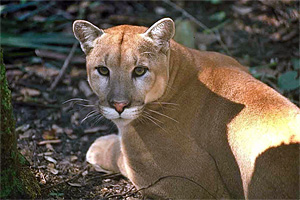
Panther Legends & Modern Sightings
No animal in the southern Appalachian Mountains can match the
panther for legend, drama, and persistent modern-day sightings
despite official consensus that the cat was eradicated in the East
over a century ago. An older generation of mountaineers grew up
hearing tales from their grandparents of panthers stalking people,
panthers stealing livestock, horrifying panther screams in the
night, and epic fights between panthers and bears.
(A shorter version of this article was published in
High Country Magazine August 2022.)
Read Story
Comment
|

|
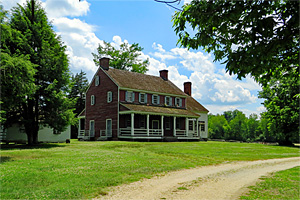
Fort Defiance, Lenoir, NC
Learn about the 1792 Caldwell County home of Revolutionary War
hero and influential western North Carolinian William Lenoir.
Lenoir is a familiar name in North Carolina, with a city in the west
and a county in the east named in honor of Revolutionary War Gen.
William Lenoir. But it’s at the secluded home this prosperous
plantation owner built in Caldwell County that you get the measure
of the man.
Read Story
Comment
The Plantation at Fort Defiance
A spin-off article about the farm that was originally published in
the Fort Defiance Chronicle.
Read Story
|

|
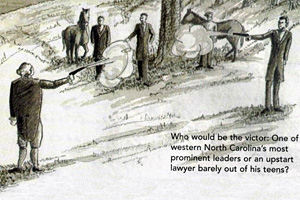
Bordertown Showdown
On the Carolina frontier in 1788, Waightstill Avery, one of
western North Carolina’s most prominent citizens, clashed
with young Andrew Jackson.
Today, Andrew Jackson is well known for his military exploits
against Indians and the British, as well as his success in politics
and government. Few modern Americans, on the other hand, are
familiar with Waightstill Avery. Ironically, the distinction of the
two men was entirely different in 1788.
Read Story
Comment
|

|

Nelly’s Tale
A supposedly true story of an encounter with a Bigfoot-type
creature on Thunder Hill, as told to me by an old woman in
1980.
Near the town of Blowing Rock, Thunder Hill rises prominently from
the Blue Ridge, dividing the streams of the Atlantic-bound Yadkin
River from the waters of the New River headed for the Mississippi.
The site has been known as Thunder Hill for generations, even before
the Blue Ridge Parkway overlook of the same name was constructed
near its crest.
Read Story
Comment
|

|
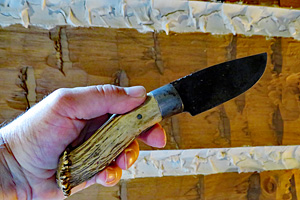
Making the Cut
The essence of frontier America is embodied in the knives and
sheaths produced by Watauga County natives Daniel Winkler and
Karen Shook.
Few tools are as ancient and functional as a knife. With so many
functions, a knife touches on almost all aspects of life at a
particular time and place. Accurately designed and made, it can
distill the essence of a culture like no other single object. A gun,
for example, suggests warfare, and a cast-iron skillet evokes
log-cabin domestic life, but a knife calls to mind both.
Read Story
Comment
|

|

Fried Apples
Fried apples are a staple in traditional mountain cooking, but
they rarely get the praise they deserve.
Fried apples are a simple yet distinctive dish widely served in the
upland South. They can be found on tables at any meal and with a
variety of other foods. They shouldn’t be confused with stewed
apples, applesauce, fried apple pies, or other apple dishes. Genuine
fried apples are a cuisine all their own with roots in agricultural
history, pioneer subsistence, and plain home cooking.
Read Story
Comment
|

|

Pisgah Astronomical Research Institute. Photo Credit: NASA.
The story behind this high-tech facility in the middle of an
extensive forest is an intriguing tale of space exploration,
espionage, wilderness isolation, Cold War history, and
astronomical discovery.
Pisgah National Forest, that sprawling stretch of federal government
land between Boone and Brevard, is hard to miss as one travels
around western North Carolina. Less visible is the Pisgah
Astronomical Research Institute, located on the site of a former
NASA tracking facility.
Read Story
Comment
|

|

Watauga County Sheriff Heads West
The tale of Cobb McCanles’ and Sarah Shull’s
adventure in the Old West and his murder by Wild Bill Hickok.
No one was surprised when twenty-three-year-old David Colbert
McCanles declared he was running to be sheriff of Watauga County.
“Cobb”, as he was known, was a natural politician, with
an outsized personality and a striking appearance.
(Originally published January 2018 on the
High Country Press)
Read Story
Comment
|

|
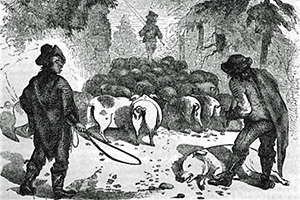
The Buncombe Turnpike
The story of the great mid-19th century livestock trail through
the North Carolina mountains that foreshadowed the later epic
cattle drives in the trans-Mississippi West.
Read Story
Comment
[I wrote this paper for a class in graduate school. While it is
obviously a scholarly essay, I still think the general reader will
find it entertaining. If you have a hard time getting into it at
first, skip over to the third page where it gets more interesting.]
|

|
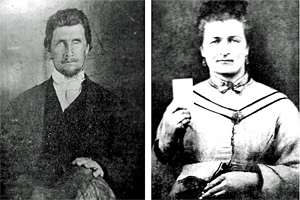
The Bushwhacking Blalocks
The Civil War adventures of this husband and wife guerilla team
are filled with shoot-outs and revenge killings.
Keith Blalock’s first experience with the Civil War came early
in 1862. He was persuaded by James D. Moore to assist the
Confederate cause by joining North Carolina’s Twenty Sixth
Regiment. Keith insisted that his wife, Malinda, be allowed to join
also. Moore agreed to the condition. Malinda dressed as a man, went
by the name Sam Blalock, and claimed to be Keith’s brother.
Read Story
Comment
|

|
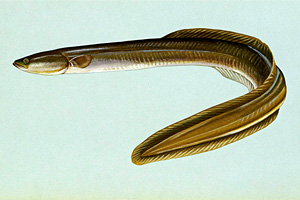
The Atlantic in Appalachia: Shad and Eel on the Move
The shad (Alosa sapidissima) and eel (Anguilla rostrata) are
aquatic equivalents of migrating neotropical birds; connecting the
Appalachians to parts of the planet totally unlike our
mountains.
In the past, the yearly shad spawning run reached deep into the
continent, in the south as far as the Blue Ridge where they simply
ran out of water. It influenced the location of Indian villages and,
after European settlement, provided the culinary basis for annual
riverside feasts in many communities.
Read Story
Comment
|

|
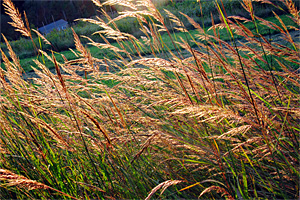
Return of the Natives
Indigenous grasses- big bluestem, Indiangrass, Eastern gamagrass,
& others- make a comeback in the East.
In 1752 a group of American settlers entered a territory yet
unreached by Europeans, which their chronicler described as “a
large plain” containing “more meadowland than one could
make use of”. He observed that “a man could make several
hundred loads of hay of the wild grass. For stock raising, it is
also incomparable; pasture in abundance.”
Read Story
Comment
|

|
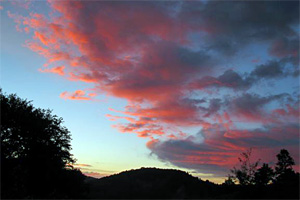
Worldwide Weather
The world’s largest climate data center calls Asheville
home.
The tour of the agency begins in a small museum room containing an
assortment of artifacts and information from the agency’s
past, like a weather logbook from the 1870s and several historical
weather-measuring instruments.
Read Story
Comment
|

|
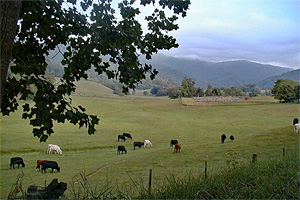
Alleghany County
Alleghany County is mountainous, but not remote; traditional, but
not antiquated; agrarian, but not unrefined.
A leisurely drive through Alleghany County reveals its abundant
treasures: The two-lane road is part of the scenery, not just a
passage through it. Aging barns seem to have grown from the soil.
Read Story
Comment
|

|

Ghost Stories
This is a collection of ghost tales I’ve collected over the
years from elderly people in the community, along with a couple of
stories drawn from Roy Weaver’s Aho history books, where
I’ve added my own comments and analysis.
Read Story
Comment
|

|
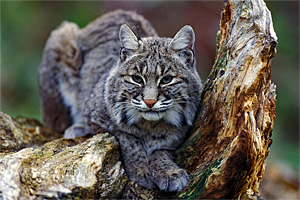
Bobcat – Photo by U.S. Fish & Wildlife Service
A series of 28 articles on plants, animals, and other natural
features in the southern Appalachians.
Read The Articles
Comment
|

|
|
|

|

